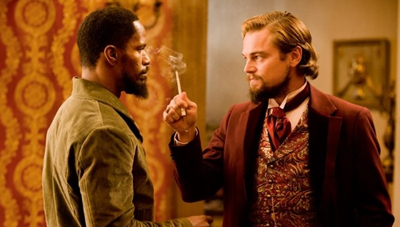Quentin Tarantino, regardless of whatever else he may be, is a master practitioner of the revenge flick: Kill Bill: Vol. 1 and Vol. 2 dealt with the revenge of one woman in the style of a modern-day martial arts movie; Deathproof is a drive-in car flick about a group of women getting revenge on a homicidal stunt man; and Inglourious Basterds finds a French-Jewish woman and a band of American Jews exacting revenge on Hitler and his Nazis in a kind of historical revisionist revenge fantasy. Now, with his latest, Tennessee native Tarantino sticks with the historical comeuppance, making a Spaghetti-Western/blaxploitation flick of vicarious vengeance against Southern white slave-owners.
Jamie Foxx plays the titular character Django, a slave whose freedom is purchased one evening by a disarmingly charming dentist-cum-bounty hunter named Dr. King Schultz (Christoph Waltz, Inglourious Basterds). Under the good Doctor’s tutelage, Django becomes one of the few free blacks in the deep South. As they travel from bounty to bounty, Django not only learns the craft, but also becomes the fastest gun in the South, and so they set out to free Django’s wife, Broomhilda (Kerry Washington), from brutal plantation owner Mr. Calvin Candie (Leonardo DiCaprio).
This film has already been decried by critics and notable filmmakers as being offensive, likely in no small part due to the shockingly common use of the N-word, usually by white folks (the film takes place two years before the Civil War); the graphic, though accurate, depictions of brutality towards slaves; and the pervasiveness of both throughout the film’s 165-minute run time. But this is all in service of telling Django’s story, one of undeniably justified revenge. Whether Tarantino has a right or not to tell this tale, and with his characteristic, cartoonish relish, is up to the viewer. But this is a Tarantino movie after all, and for every bit of comedic violence, for every brilliantly Mel Brooks-ian deflation of the KKK, there are unflinchingly disturbing scenes of brutality, wounds of our country’s past ripped open anew, which few films have dared before.
And for these reasons, the film is often discomforting and hard to watch. But it is precisely because these centuries-old tensions are not in the subtext, but right in our faces, that Django Unchained is yet another vital, often hilarious, often nail-biting, excellently acted, excessively gory, and hugely entertaining Quentin Tarantino revenge flick.














